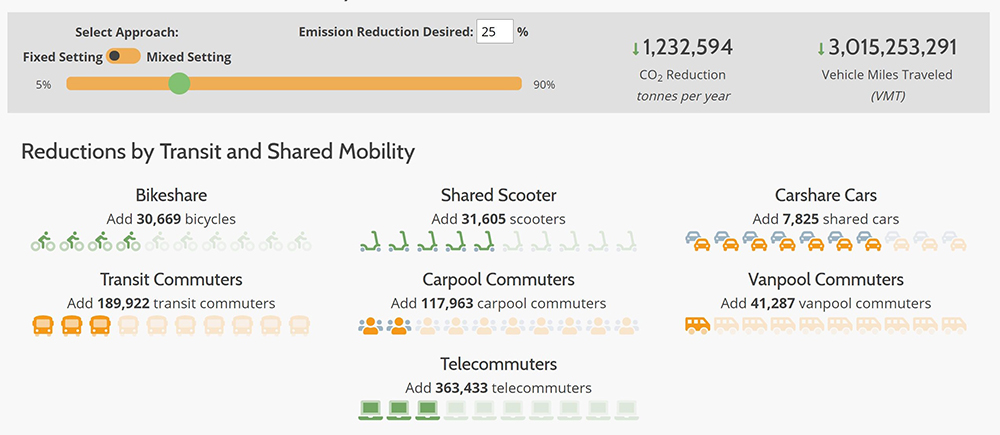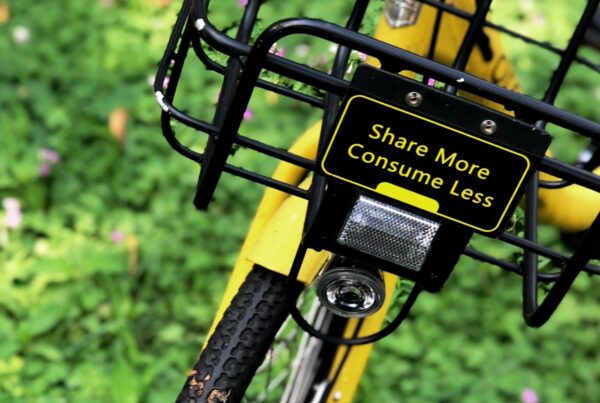Welcome to the Shared-Use Mobility Center’s weekly guide to the most impactful news, thought-provoking articles and innovative technologies that are shaping our transportation future. We believe in sharing information, just like sharing cars, bikes, and scooters, so if there’s anything additional you’d like to see, just drop us a line.
SUMC News and Announcements
Hear SUMC Founder and Executive Director Sharon Feigon’s Presentation on the Role of Equitable Mobility in Chicago’s Future
On August 17, the Federal Bank of Chicago hosted a webinar as part of Project Hometown, a new initiative to foster discussion around the challenges and opportunities in the city’s Seventh District, which includes the downtown, south and west side areas. In The Role of Urban Planning, Architecture, and Transportation in Chicago’s Future, Sharon Feigon, Commissioner of the Chicago Department of Planning and Development Maurice Cox, Foundation for Homan Square Executive Director Kevin Sutton, and Chicago Tribune architecture critic Blair Kamin shared their diverse and in-depth ideas.
Shared Mobility Benefits Calculator Update Reflects Changing U.S. Work Habits During COVID-19
 The Shared-Use Mobility Center’s Mobility On Demand Shared Mobility Benefits Calculator now allows users to find CO₂ emissions and vehicle miles traveled (VMT) reductions by the number of telecommuters in a selected city from a list of over 300 nationwide. This new feature reflects the latest national trends as 40% of the U.S. workforce was working from home as of June 29, 2020, according to the Stanford Institute for Economic Policy Research. Surveys have found that this is likely to continue on a full or part-time basis.
The Shared-Use Mobility Center’s Mobility On Demand Shared Mobility Benefits Calculator now allows users to find CO₂ emissions and vehicle miles traveled (VMT) reductions by the number of telecommuters in a selected city from a list of over 300 nationwide. This new feature reflects the latest national trends as 40% of the U.S. workforce was working from home as of June 29, 2020, according to the Stanford Institute for Economic Policy Research. Surveys have found that this is likely to continue on a full or part-time basis.
This additional mode joins a range of options users can choose to estimate the amount of climate change-inducing CO2 reductions in tonnes per year, as well as the decrease in overall Vehicle Miles, Traveled (VMTs).
The Shared Mobility Benefits Calculator was created by the Shared-Use Mobility Center (SUMC) with financial support from the Hewlett Foundation and the McKnight Foundation. It is available to use at SUMC’s Mobility on Demand Learning Center.
In case you missed it last week, this series of three Learning Center Case Studies looks at transit food delivery programs created in response to COVID-19 to meet the needs of persons with disabilities, the elderly, and those with health complications, and lets you deep-dive into the Denver Regional Transportation District and the rural Charlevoix County Transit programs.
Congratulations to the City of Austin and Capital Metro’s new Austin Transit Partnership
The combined effort will guide administrative, financial, and some technical components of Project Connect, the city of Austin’s transit innovation plan that features underground rail, expanded bus service and the Metro Bike program with an all-electric fleet—and $300 million in anti-displacement funds. What’s next? A ballot measure to raise $7.1 billion for the initial investment will be on the November 2020 ballot.
Mobility Justice
Tufts University professor and transportation equity advocate Julian Agyeman discusses how a society cannot be sustainable if it’s not equitable and gives examples from Black, Brown, and Indigenous communities in the U.S. on the latest Talking Headways Podcast episode.
The pandemic and current mass exodus of ridership in public transportation have left agencies strapped for funds, leading to service cuts which have only fueled existing inequality in lower-income communities of color that depend on transit to get around. Read why we need to #SaveTransit in the New York Times.
The law, rise of the personal automobile, and the evolution of traffic enforcement have merged on an episode of The War on Cars podcast featuring historian, legal scholar, and novelist Sarah Seo chatting about her book “Policing the Open Road”.
Parks are staples in thriving, livable communities. Yet, a new study by the Trust for Public Land shows that non-white neighborhoods have parks that are as half as large and five times more crowded than majority-white areas. This must change.
Ridehailing/Carsharing/Carpooling
After last week’s ruling ordered Uber and Lyft to classify their drivers as employees instead of independent contractors, the companies have been ramping up efforts to sway riders to support the Proposition 22 measure that will give voters in California the choice of permanently classifying ridehail drivers as contractors.
Meanwhile in the Emerald City, Seattle Mayor Jenny Durkan is moving forward with a minimum wage for ridehail drivers, with the bill making its way to the Seattle City Council this week.
Navigating an ever-changing mobility landscape, Zipcar has emerged to be quite the tenacious although not infallible player during this pandemic as other competitors, specifically free-floating models, have faltered in many key markets around the US.
Kia Motors is on a roll expansion-wise with its global mobility offerings, growing its Kia Flex vehicle subscription service in Korea and ramping up its EV carsharing efforts in Europe and North America with its WiBLE and MoceanLab brands, respectively.
Bikesharing and Micromobility
Dockless scooters are officially back on Chicago streets (rideable 5am-10pm daily) with roughly 10,000 scooters available throughout the city from Lime, Spin, and Bird. Block Club Chicago has the scoop.
Sanitation and micromobility come together for this new (patent pending) idea called the KirbyPod that uses smart tech to help fleet operators clean scooters with a built-in hand sanitizing unit.
Santa Monica’s Breeze bikeshare is shutting down this November, citing a decline in ridership from the pandemic and the rise of shared scooter offerings from private companies. Not all hope is lost on e-bikes in the city though, with Lyft planning to launch an e-bikeshare program later this year.
Traffic playgrounds (also dubbed “traffic gardens”) are a growing DIY education movement that uses paint and chalk to teach kids about bike safety using miniature neighborhood play spaces. Sam Balto, a phys-ed elementary school teacher interested in keeping kids active outdoors, is leading the charge for these safe, shared spaces in Portland.
Transit
New York, among many other US cities, is reaching alarming levels of public transit deficits that will lead to crippled transportation systems, affecting millions of workers and riders and upending the economy and daily life. Congress must enact legislation that will #SaveTransit now.
San Francisco will be bringing Muni Metro back on August 22, with social distancing in mind and altered service, but disability rights advocates believe these changes will create painful transfers and limited accessibility solutions for those depending on transit.
The Center for Transportation and the Environment has launched a new guidebook that gives transit agencies and planners a set of best practices and examples for deploying zero-emission buses in cities while emphasizing collaboration with tech providers, utility and energy companies, and contractors.
The Greater Cleveland Regional Transit Authority has released a redesigned bus system proposal that would increase frequency to every 15 minutes for several major routes and focus on improving access to work, education, and healthcare.
Technology
Michigan wants to create the road of the future through a new partnership with Cavnue, a subsidiary of Sidewalk Labs’ spinoff Sidewalk Infrastructure Partners, on a stretch of road between Detroit and Ann Arbor using cameras, sensors and other integrated technologies to pave the way for shared, connected, and automated vehicles—by 2022.
In recent years, autonomous shuttle projects were the talk of the town as cities ramped up efforts to bring exciting, emerging technologies to the transportation realm. As pilot projects meet uncertain futures for development and skepticism for an automated ride run wild, tech leaders and local officials are trying to rebound from the uncertainties of a driverless environment.
A new partnership between Michigan’s PlanetM initiative, self-driving tech companies Navya and Bestmile, and other state organizations brings an accessible, autonomous paratransit service to Detroit that will connect two underserved communities where people have mobility needs to the Detroit Medical Center Heart Hospital.
Shanghai’s robotaxi market is heating up with new self-driving ridehailing service from startup AutoX, competing with mobility giant Didi’s recently launched AV taxi outfit.
Sustainability
“When two tons of plastic, glass, and metal meet 150 pounds of flesh and bone, the person is going to lose…” Why has pedestrian-friendly technology for cars seen little to no growth in the past several decades in the US, while the pervasiveness of driver-safety features is so common, even everyday commercials tout them? Pedestrians and cyclists deserve better safety precautions, and automakers need to make them standard.
Urban metros and the pandemic aren’t as closely tied as you may think, as this new study of 36 of the densest cities worldwide from researchers Deepti Adlakha from Queen’s University Belfast and Jim Sallis from University of California San Diego finds “‘near-zero’ correlation between density and COVID-19 morbidity and mortality.”
For public space to work for all, street planning for communities must include the perspective of everyone who navigates the neighborhood, including people with disabilities. Bloomberg CityLab breaks down how cyclist advocacy and bike lane infrastructure development can often overlook the needs of accessible design.
Construction can severely hamper sidewalk and bikeway access in congested areas, leaving pedestrians and cyclists to maneuver tight and unsafe spaces to keep moving. Bikemore’s “Detours Done Well” piece shows how ‘closed for construction’ doesn’t always have to mean ‘closed from access’.
Requests for Proposals, Inquiries, and Information
RFP: Transportation Network Company
IndyGo
Indianapolis, IN
Deadline: August 31, 2020
RFI: Mobility Services Partnerships
LA Metro
Los Angeles, CA
Deadline: September 4, 2020
RFP: Specialized ADA Transportation Services: Southern Region Los Angeles County
Access Services
Los Angeles, CA
Deadline: September 17, 2020
(Registration required)
RFI: Development of an RFP for a Statewide Mobility Services Program
New York State Department of Transportation
New York, New York
Deadline: September 21, 2020
Did someone forward this to you? Sign up for our newsletter here.




